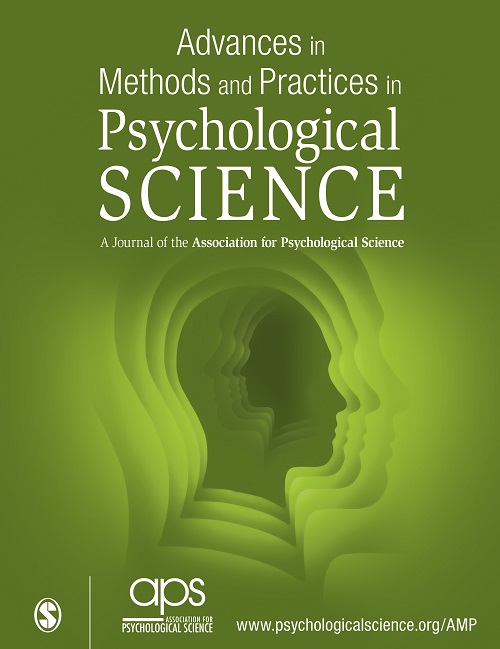Experiment-Wise Type I Error Control: A Focus on 2 × 2 Designs
IF 15.6
1区 心理学
Q1 PSYCHOLOGY
Advances in Methods and Practices in Psychological Science
Pub Date : 2021-01-01
DOI:10.1177/2515245920985137
引用次数: 4
Abstract
Factorial designs are common in psychology research. But they are nearly always used without control of the experiment-wise Type I error rate (EWER), perhaps because of a lack of awareness about viable procedures for that purpose and perhaps also because of a lack of appreciation for the problem of Type I error inflation. In this article, key concepts relating to Type I error inflation are discussed, with emphasis on the 2 × 2 factorial design. Simulations are used to evaluate various approaches in that context. I show that conventional approaches often do not control the EWER. Alternative approaches are recommended that reliably control the EWER and are simple to implement.实验明智的I型误差控制:关注2×2设计
析因设计在心理学研究中很常见。但是,它们几乎总是在不控制实验方面的I型错误率(EWER)的情况下使用,这可能是因为缺乏对这一目的的可行程序的认识,也可能是因为缺乏对I型错误膨胀问题的认识。在本文中,讨论了与I型误差膨胀相关的关键概念,重点是2 × 2因子设计。在这种情况下,模拟用于评估各种方法。我表明,传统的方法往往不能控制EWER。建议采用其他方法可靠地控制EWER并易于实现。
本文章由计算机程序翻译,如有差异,请以英文原文为准。
求助全文
约1分钟内获得全文
求助全文
来源期刊
CiteScore
21.20
自引率
0.70%
发文量
16
期刊介绍:
In 2021, Advances in Methods and Practices in Psychological Science will undergo a transition to become an open access journal. This journal focuses on publishing innovative developments in research methods, practices, and conduct within the field of psychological science. It embraces a wide range of areas and topics and encourages the integration of methodological and analytical questions.
The aim of AMPPS is to bring the latest methodological advances to researchers from various disciplines, even those who are not methodological experts. Therefore, the journal seeks submissions that are accessible to readers with different research interests and that represent the diverse research trends within the field of psychological science.
The types of content that AMPPS welcomes include articles that communicate advancements in methods, practices, and metascience, as well as empirical scientific best practices. Additionally, tutorials, commentaries, and simulation studies on new techniques and research tools are encouraged. The journal also aims to publish papers that bring advances from specialized subfields to a broader audience. Lastly, AMPPS accepts Registered Replication Reports, which focus on replicating important findings from previously published studies.
Overall, the transition of Advances in Methods and Practices in Psychological Science to an open access journal aims to increase accessibility and promote the dissemination of new developments in research methods and practices within the field of psychological science.

 求助内容:
求助内容: 应助结果提醒方式:
应助结果提醒方式:


